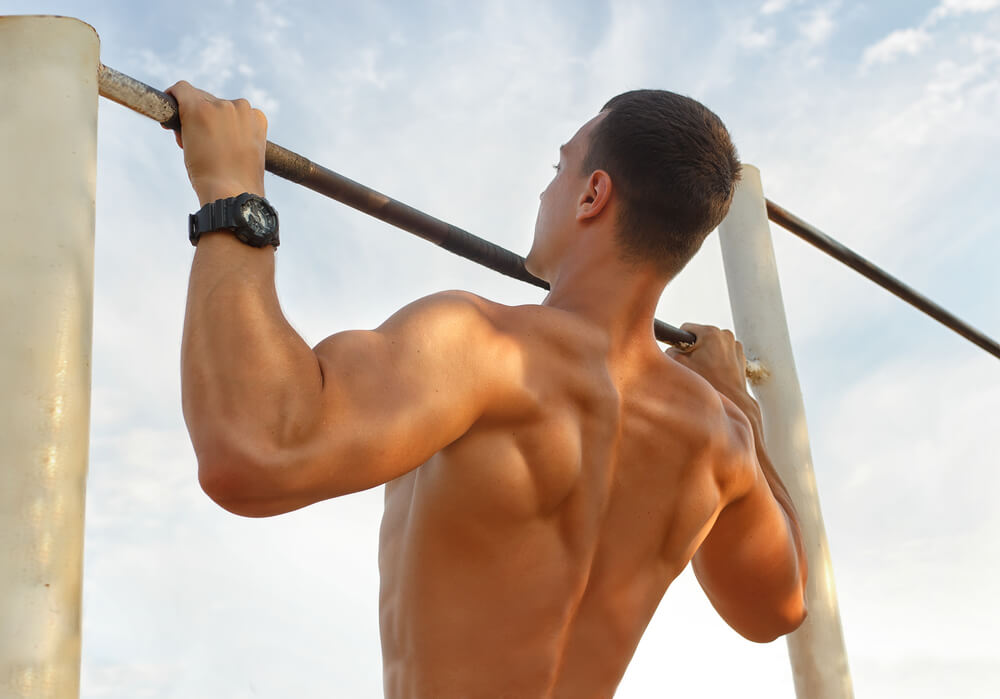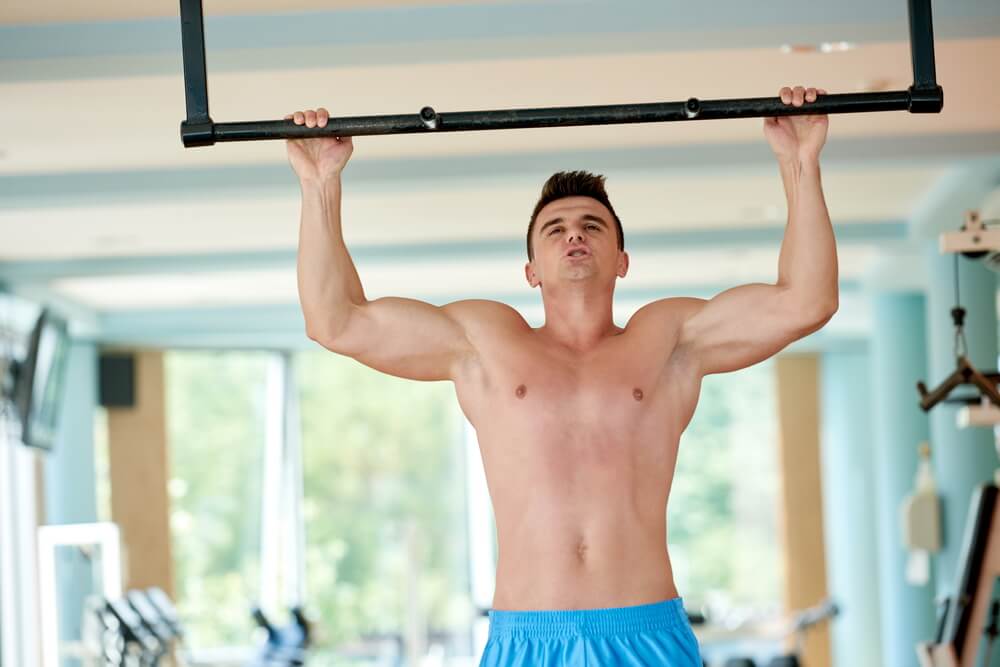
Chances are if you are active on social media you have likely heard of the kipping pullup. But, do you know how to do it?
We do and we’re sharing all of the details right here!
There’s no doubt that you’ve seen a few kipping pull-up sessions on YouTube videos or maybe even in your news feed on social media.
What are they?
They are a CrossFit staple that has everyone saying, “What the bleep is that guy doing?” Yes, they look silly, out of uniform and pretty much like a child trying to stay hanging on the monkey bars after he or she ate some greasy chips.
But, there actually is a purpose to them and I will explain what that is.
Kipping pullups are an exercise that either gets a lot of love (from the CrossFitters) or a lot of hate (from the rest of the fitness crowd). But, even still, there are a few reasons you might want to give them a try no matter what side of the fence you’re on.
Here Is A Little History On The Kipping Pullup
The reason behind the kipping pull-up was initially to allow a person to get as many unbroken reps as humanly possible, as quickly as possible, during competitions.
If your chin goes over the bar, it counts, no matter if you used momentum or pure strength.
Since kipping pull-ups are allowed in CrossFit competitions, it is pretty rare that you will see someone doing traditional pullups as they take too much time and strength when the point is to get as many reps in and go as fast as you can during these games.
Are Kipping Pullups Even Real Pullups?
The short answer is no. They are not like your traditional pull-ups. They’re also not meant to build strength in the same sort of way as traditional pull-ups do. In fact, kipping pull-ups are more like a 100-meter dash for your arms.
They’ll build much endurance and they have a high demand on the upper body.
Traditional pull-ups are slow and controlled, focusing on the arms, shoulders and back to build strength and muscle. Kipping pull-ups are more like cardio and an excellent way to get a quick burnout. For that reason, they would be a good addition to a high-intensity interval training (HIIT) session.

Benefits Of Doing Kipping Pullups
There are a few benefits of doing kipping pullups. Wondering what they are?
Wonder no more.
For starters, they allow you to do more reps. Though these cheater pullups don’t exactly benefit your regular pull-up strength, they do allow you to keep going and going for many reps. It’s great for your metabolism and knocking off some body fat as you work your body.
Kipping pullups also work many muscles in many different ways. We’re used to certain exercises that we all do routinely and that’s the way we like it, but when you add something new, it can actually be pretty beneficial to your mobility and range of motion.
Just a few weeks ago, I found my leaf raking muscles!
I’m always doing oblique exercises, pushing hard and it takes a lot for me to get sore (not that I’m some kind of super tough person, that’s just how it is). But, after two hours of raking leaves, the next day leaves me with the feeling of ouch (I definitely don’t sound all that tough now). So it’s good to try new things and work the muscles differently as it makes you more agile and free to move.
They can increase your athleticism. Hey, your goal might not be to become an athlete, but increasing your endurance is always beneficial in the gym and in your daily life. Though kipping pushups are not the best bodybuilding move, they will eventually build up strength in the upper body and benefit endurance for sure.
Are Kipping Pullups Safe To Do?
You can take any popular exercise and easily turn it into an injury-filled disaster simply by doing it wrong. The key to doing any exercise is proper form and safety. There’s been a lot of talk about the safety of kippings and that’s for good reason. You do not want to just go and bust 50 of these out without knowing the technique, and yes there is a technique to these crazy looking things.
First of all, you do need some grip strength to hang on for dear life, especially with the way your body is pulling and jerking all over the place. Needless to say, you do not want to lose your grip, fall down and go boom!
Another thing is, you have to control yourself as much as you can. Don’t let your back twist and your body weight slam down for your shoulder joints to catch you.
Don’t worry. I’ll explain how to properly do them a little later.
Are There Risks Involved?
There are risks to doing kipping pullups.
Want to know what they are?
Read on to find out what they are and how you can prevent them.
Strength prevents injury.
Even though the completion of a kipping pull-up mostly comes from your momentum (legs and hips), you still need to be able to reach your chin over the bar and then lower yourself without jerking your shoulders out of the socket. As a result, it is best if you do have some upper body strength and can perform a few traditional pull-ups before you try kippings out so that your descent does not jack your body up.
The technique does matter. I know what you are thinking, and I thought the same thing when I first saw kipping pullups. Yes, these things look sloppy and without technique. But, honestly, there is a proper way and a proper technique to performing these correctly to prevent injury.
Know what muscles to fire at what time.
To prevent shoulder injuries, and any other type of injury, you need to pay attention to your timing on these pull-ups. Also, your shoulder positioning is going to be crucial during the lift, swing and lowering in the movement.

Before Doing A Kipping Pullup, You Should Be Able To Do A Traditional Pullup
It doesn’t take nearly as much strength to do a kipping pull-up as it does to do a traditional pull-up because you are using so much momentum to get your chin above the bar instead of the strength of your arms, back, and shoulders. But, being able to perform a traditional pull-up will certainly prevent any injury or mishaps when you move on to a kipping pull-up.
The reason I say this is because even though the kipping looks pretty much like you are swinging up like George of the Jungle using momentum, it still requires some strength to control the move. If you do not have the strength in your shoulders, then you can easily tear them up in a heartbeat by letting your body drop down without catching your weight.
So be sure your upper body is ready, do some traditional pull-ups and then you will see what I mean.
This Is How To Perform A Proper Kipping Pullup
Finally, we are getting to the meat of it all and you’re ready to do this thing!
Be sure you go over the directions carefully to prevent injury. You might also want to check out a few videos so that you can see exactly what I’m talking about in my explanation of the move.
Grab the bar with your hands a little wider than shoulder-width apart and palms facing away from your body. Your arms should be locked and your body hanging freely. Swing your hips back by pushing the bar away from you and your legs should swing forward at this time. As your hips start to swing back, drive them upward by kicking your feet up. At the same time, pull yourself upward until your chin reaches the bar. Immediately and swiftly, push yourself away from the bar at the top of your pullup, lower with control, push your hips back again and repeat for as many reps as you can.
Here are a few more tips:
- During the exercise, focus more on lower body momentum rather than pulling with the arms. Use your hips!
- Do not let your torso twist from side to side in any way. Keep everything level and straight ahead of you.
- Try each movement of the exercise separately until you fully understand how to do it and then slowly add the next step and the next.
- Be aggressive with kipping pullups to keep the momentum going the entire time you are doing them.
- Practice often. Why? Practice improves everything!
This Is When To Use The Kipping Pull-up In Your Workout Routine
The kipping pull-up doesn’t just have to be for CrossFitters. As mentioned, it can help you with your endurance in the gym and burn up some extra fat, which will then expose those amazing muscles you’re working so hard on.
I think the best way to incorporate kipping pull-ups into your routine is to blend them up with some traditional pull-ups. For instance, go ahead and do one set of however many reps of the traditional pull-ups you can do, followed by a set of kippings. Go back and forth with this for three sets of each.
I promise you, everything will be burning and you’ll be gasping for air by the end.
You can also add the kipping pull-ups to the end of your regular shoulder and back session to finish off those muscles and make sure you got them all fatigued. No matter where you place them in your routine, they are going to fry up some calories and help you with free movement and range of motion.
Heck, you can even use them for your warm up if you like!
Try This Routine For Back And Shoulder Day (Kipping Included)
Start with a few warm-up reps of your traditional pull-ups. Switch to kippings and bust out as many reps as you can in one minute. Rest for one minute then do two more sets and rest again (yes we just used kippings as a warm up).
3 Sets X 6-8 reps – Deadlift
3 sets X 8 reps – Military press
3 sets X 20 reps – Traditional pullup
3 sets X 10 reps – Overhead dumbbell press
3 sets X 10-12 reps – Bent over dumbbell row
4 Sets X 8-10 reps – Seated cable row
3 sets X 10 reps – Upright row
Finish off with as many kipping pull-ups as you can do, then cool down and stretch out your back and shoulders.
And If You Are Into HIIT, Then You Should Try This Routine
Warm up for at least five minutes before you begin. You can do this on the elliptical machine, treadmill or even with some active stretching moves.
45 seconds of kipping pullups
30 seconds of rest
45 seconds of burpees
30 seconds of rest
45 seconds of plyo pushups
30 seconds of rest
45 seconds of jump squats
30 seconds of rest
Repeat this sequence three more times, then cool down and stretch it out.
Conclusion
No matter what your goals are, there is always a new exercise you might enjoy adding to your routine that can benefit you in many ways. With the kipping pull-up, you might find some new muscles, more flexibility, a better range of motion and also get a little more sweaty during your sessions.
There’s no shame in giving them a try. If you do feel embarrassed, maybe just try them at home till you get the gist of them and feel more confident. I do know one thing about this exercise: You can’t do them on a power tower. I already took the liberty of personally testing that one out for you (face palm) and it does not work.
Good luck!
By Heather Neff, CPT
Terry
Latest posts by Terry (see all)
- How Important Are Net Carbs For Building Huge Muscle? - Apr 28, 2017
- The Matt Damon Workout Explained - Apr 27, 2017
- Watercress – Benefits And The Best Way To Consume It - Apr 26, 2017









